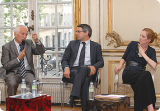
Report: Sales of agricultural assets to foreign investors in Developing Countries
Monday, June 28, 2010, Vincent Chriqui, Director General of Centre d’analyse stratégique has handed Nathalie Kosciusko-Morizet report: Sales of agricultural assets to foreign investors in Developing Countries.
This report commissioned by Nathalie Kosciusko-Morizet the Centre d’analyse stratégique aims to provide a more transparent framework for these transactions and rules to ensure they are accompanied by social progress for the country "sellers". While European industry of the food plans to devote much of its investment outside the EU, the various solutions proposed will shed new light on for public authorities like the European authorities.
Over one billion people today suffer from hunger worldwide. The food crisis of 2008 further clouded the picture by falling into chronic hunger and poverty, in the words of the Director General of FAO, 100 million more people than in 2007. While the world population, estimated in 2010 to 6.8 billion people, projected to reach 9 billion by 2050, food security is needed at the heart of the great challenges of this century and puts on center stage the issue of agricultural asset sales to foreign investors.
To ensure their supplies, many countries have adopted aggressive strategies of arable land acquisitions outside their borders, especially in developing countries (DCs) and Least Developed Countries (LDCs), where these investments should result in development opportunities.
The absence of land governance in most countries "guests", especially on the African continent, as code to supervise and regulate these transactions may have dramatic consequences on local populations. The land-grabbing, rising food prices and the pollution of the environment are the major risks. At these very real threats also adds the risk of speculative drift on arable land.
Feed 9 billion people by 2050 requires two levers to operate:
- increase agricultural production worldwide by 70%, according to FAO estimates, which means to significantly increase investments in agriculture, particularly in LDCs and DCs.
- Enable the poor to access food. Investment in agriculture in LDCs and developing countries are therefore likely to grow very strongly. The recent financial crisis has shown us: rather than be forced one day to moralize in the emergency potential abuses of a system, it is better to regulate the upstream. Therefore it behooves us to set up a regulatory phenomena of agricultural sales.
It could be based on two principles:
- A massive injection of capital in the agricultural sectors in developing countries is essential to feed eight billion people in 2030. We must therefore increase investment and secure: the lack of a land recognized in much of African states is a major source of risk for investors;
- but these investments are however acceptable if they are made responsibly. Number of developing countries and LDCs are choosing to sell farmland to companies and foreign states, even though some are unable to feed their people Investments must be accompanied by a transparent consultation with local stakeholders .
This responsibility could lead to the creation of a label " Agro Responsible Investment . " This should reduce the risk of long-term associated with the project and allow investors to get better loan rates. Moreover, advertising of the label among consumers could promote the sale of relevant products.
It should also be supported by international institutions that reflect actively on this issue and determined action of the European Union and France to assist host countries to negotiate with investors.
Les ressources
- Télécharger le rapport
- Télécharger l’avant-propos de Vincent Chriqui
- Télécharger le Dossier de presse
- Télécharger le discours de Nathalie Kosciusko-Morizet
- Télécharger le discours de Vincent Chriqui
- Consulter la Note de Veille 182 : Pour des investissements agricoles responsables dans les pays les moins avancés et les pays en développement : cliquer
